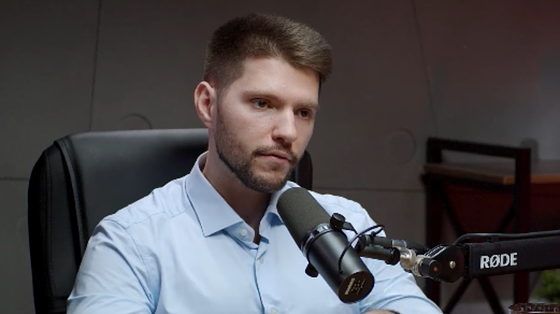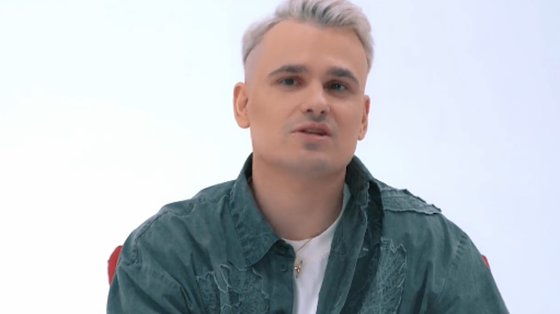Medical assistant Olena Nediy provided medical aid in bomb shelters during the shelling. She took her son to the outskirts of the city hoping that the war would not reach there, but the inferno covered the entire Chernihiv region. Olena had to get to the area where her son was on foot to further leave for a safer place and save their lives.
I am a biologist by profession and I currently work here at the cancer centre. Before that, I worked in Chernihiv, in Chernihiv region, in the pathoanatomy [centre]. This is the morbid anatomy bureau, which is a branch of the laboratory in the capital. I got married and gave birth to a son. That is, I have friends there; I have everything there. Speaking of the possibility of some military actions, some preparations were made in Chernihiv region, in Chernihiv city, I would say.
Probably about some two weeks before this, we were being prepared gradually. We were asked to get the so-called grab bags ready.
That is our documents and things of first necessity, but we did not believe in it at all, until the last moment. And when my son came back from school on 23 February, and I came back from work, he said that our class teacher... My son studies in primary school. He is in the fourth grade. So all parents were asked to write a note. I checked it out in our [parents’] group to know what exactly the matter was.
The point was that they were making some preparations in case such military actions happen. That is, parents had to prepare a similar grab bag for their children, so to speak, for school. Children were supposed to have it with them. There had to be a copy of the child’s birth certificate in the bag, as well as a note with the surname, first name, patronymic, date of birth, information about the parents and telephone numbers. There should also be a small bottle of water, some cookies and a bar of chocolate. And another note had to be written addressed to the schoolmaster. Since the basement could not accommodate all the schoolchildren at the time of the air raid warning, they made a decision that students from senior classes will be released home, but the younger ones... We had to write a statement giving our consent to the release of our children home if their home is nearby. Otherwise, a child had to go down to the basement together with the class teacher and wait there when his or her parents would pick them up. I had to indicate in writing who exactly would be picking up my son, whom I allow to pick him up besides me. So that evening, I felt some anxiety for the first time.
The next morning came. The morning began with an air raid warning or siren. My son was still sleeping. I woke up and first thing, I started watching the news.
When I read that the war started, I kept sitting... Well, I remained sitting for an hour. I did not know what to do. Should I wake him up? We live together with my mother. My father died two years ago. My mother is a disabled person. She is in the second group of disability. Thus, I did not understand at all what exactly I had to do at that time... While I was the main [family member]. What should my actions be? Then we called our supervisor at work because we were supposed to go to work that day. So I made a decision. That is, I realized that we would continue working, and that maybe we would be tasked with some other type of work, so I needed to take my son and my mother somewhere where they could be in safety.
I woke up my mother and told her to pack up things as the war began. I made some arrangements. Well, a village near Chernihiv. I did not think that the invaders could come there. We have some close relatives there and so I agreed that they (my son and my mother) would be taken there. Well, that’s what we were going to do. My son was crying and could not understand what to do either. Then I went to a store. On my way back from the store, which was at around 9 o’clock, we already heard some artillery fire. That is, we live just... that end of Chernihiv, to which the road from Synkivka goes. This is the area close to the border, through which they [the invaders] were moving first towards Chernihiv.
Then I went to my work. I was coming back home from work under air strikes, and people in our area were already hiding in a bomb shelter. I went down to the bomb shelter for the night. When I came home to pack up my things, there was such a strong shellfire that it was impossible to go to work. Our supervisor told us who needed to come and who could stay home, told us all to save our lives and stay in the bomb shelters. So I returned to the bomb shelter.
I stayed there for two weeks. The bomb shelter... Well, that’s how things came around. I had to. I had to.
Well, the volunteers came and asked if there were any medical workers there. Surely, I could not remain silent, and so we organized a medical care office there providing first medical aid. There was also a medical nurse among those people staying in the bomb shelter. That is, there were two of us.
Since there were about a hundred people in the bomb shelter, and they were mostly mothers with kids, elderly women and men, who had high blood pressure, so some of them needed to be under medical supervision. All the more so that the ambulance came only to the wounded, and only when there was no artillery shelling in that area. So I was providing medical assistance there for two weeks. In the morning, approximately from half past six to nine o’clock, I could run home. By the way, my house is some 15 minutes away. I ran there to cook something and bring it with me, but later I did not have time for that anymore.
It so happened once that I stayed at home because the situation escalated terribly. We did not have any bread. Well, we ran out of it in four or five days. Not all food stores were open. They had limited working hours and bread was delivered during a limited time. So we could not always buy it during the breaks between the shelling attacks. Some bread was delivered by volunteers.
They also delivered some medicines, but that was during the times when shelling paused. In the afternoon, they could come to us and bring something. In about a week’s time, our neighbourhood in Chernihiv [was] almost completely destroyed. All hospitals were left without windows and roofs. Literally in two weeks, they destroyed a lot of the infrastructure in our neighbourhood. There was no water supply, no electricity and no telephone connection. I could not get through to my family and friends for almost three weeks. I decided to get to my son by any means possible so that I could be near him again. I made several attempts.
We did not have a “green corridor” at all. People left [the city] at their own peril and risk.
The head of our administration warned them that there could be... Well, he could not forbid, but he warned people that they could be targets and could come under fire. People left through the motorway bridge. The military let them through by small [groups], so to say... They had to go one after the other, and there were cases when they were shot at.
My friends told me that a car in front of them was shot. They could not stop and speeded further on. I made two attempts [to leave]. It was difficult to get any gasoline. It was available only for the military. Those two attempts were unsuccessful because we waited for our turn but fighting began then. Then [only] a pedestrian bridge was left. It was also shelled very hard, and it was very difficult, very scary, when I had to go across the field. It was an open area and there were some unexploded shells from Grad MLRS.
It is quiet, but then you hear a clap and here it starts. They fired cluster rockets. I heard several explosions simultaneously. Well, I managed to get to the village.
I lack words to describe that feeling when you hug your child, and I want to wish those russian mothers to never feel this, such pain and despair. And I know that I have got just a little grief compared to what other children suffered when their mothers died before their eyes. That is [horrible]... I was all the time looking for a way to take my son out because he is very emotional...
We had airplanes. I came once... It was on 20-21 March, and on 23 March, they blew up the motorway bridge. That night was the most terrible one. It was... Well, they managed to [blow it up] only from the sixth attempt. Well, when I was in Chernihiv, their planes flew in. I still cannot sleep at these particular hours.
I get up and look around. We had incoming artillery or air strikes at these hours. It is scary because when they drop this 500-kilogram bomb, the entire neighbourhood shakes. Our house moved and my son did not get out of the cellar. He was frightened.
I wanted to take him out, but I understood that I could not get out of there at that time. We were constantly shelled by russians from that side. There was only one way... through the field again, Chernihiv. It was dangerous there too, so I hesitated whether to take the child out or not. Then a volunteer came. He came for women. A volunteer came to pick up women with children. There were several of us there... We had to decide in 15 minutes.
Well, naturally, my son was very scared. He was crying and praying. He said, “Mum, don’t take me there. We will be killed. You are taking me to where we will be killed.”
I said, “You know sonny, we are in bad luck, in trouble either here or there. But we still have a chance to leave.” We only had a backpack with documents and that was it. We could not take anything else with us. We could not take my mother with us because they evacuated only women with children. She stayed behind. It was also... those moments of farewell were... Later, when there were negotiations for them to withdraw back to their borders, when Chernihiv was de-occupied, she slowly walked across the field again, across the pedestrian bridge (it was damaged, it was in holes from shells) and reached the city. If it were not for my son, I would have stayed there, I would be clearing and removing that rubble now, I would engage in restoring Chernihiv.







.png)



